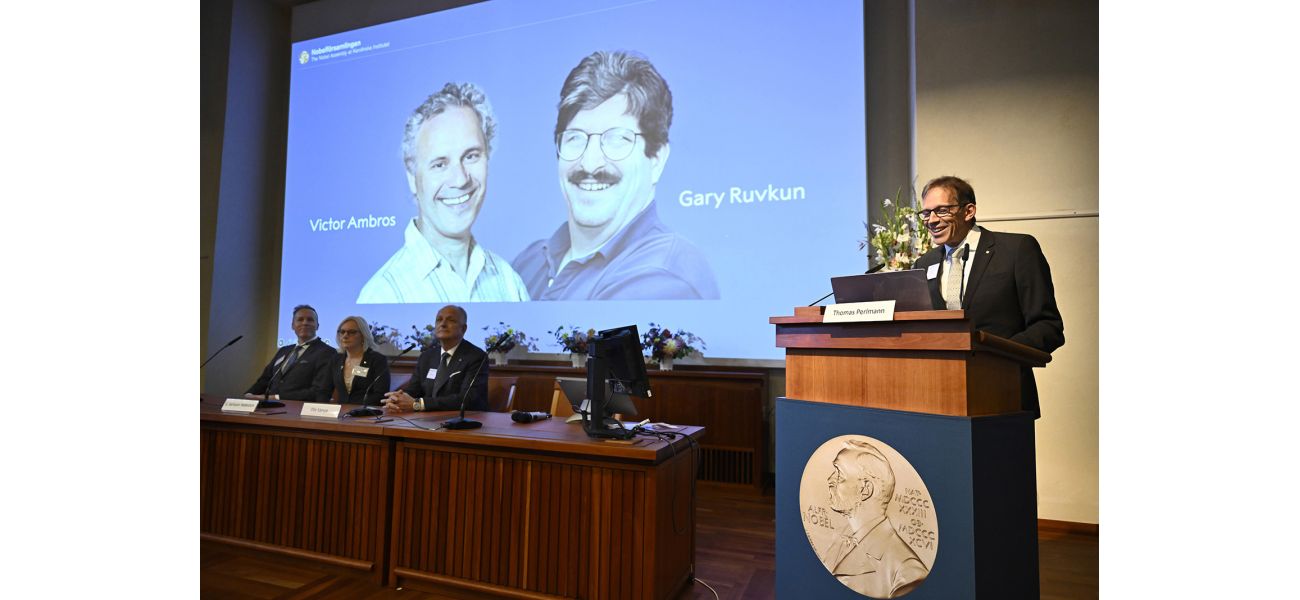Two Americans awarded Nobel Prize in medicine for finding microRNA.
The Nobel Assembly stated that the discovery has crucial implications for the development and functioning of organisms.
October 7th 2024.

The highly coveted Nobel Prize in physiology or medicine has been proudly awarded to two American scientists, Victor Ambros and Gary Ruvkun. Their groundbreaking research on microRNA, tiny pieces of genetic material, has revolutionized our understanding of gene regulation at the cellular level. This discovery has immense potential for the development of new and improved treatments for diseases such as cancer.
The Nobel Assembly at the Karolinska Institute, responsible for awarding the prize, declared the duo's discovery as "fundamentally important for how organisms develop and function". Their work has revealed a completely new principle of gene regulation, which has proven to be essential for all multicellular organisms, including humans. This statement highlights the magnitude of their contribution to the field of medicine.
Ambros conducted his research at the prestigious Harvard University and currently holds the position of professor of natural science at the University of Massachusetts Medical School. Ruvkun's research, on the other hand, was carried out at the Massachusetts General Hospital and Harvard Medical School, where he serves as a professor of genetics. According to Thomas Perlmann, Secretary-General of the Nobel Committee, he had the privilege of speaking to Ruvkun on the phone just before the official announcement was made. Perlmann described Ruvkun as sounding exhausted at first, but quickly became ecstatic and overjoyed upon realizing the significance of the award.
Initially, Ambros and Ruvkun were studying the timing of genetic developments in two mutant strains of worms commonly used in scientific research. Their goal was to identify and understand the role of the mutated genes responsible for regulating the timing of cell development. Through their extensive research, they discovered a mechanism known as microRNA regulation, which has played a crucial role in the evolution of organisms for millions of years.
The Nobel Committee stated that Ambros and Ruvkun's groundbreaking discovery has shed light on a new dimension of gene regulation, which is essential for all complex life forms. This has paved the way for scientists to explore new approaches for treating diseases like cancer by targeting gene regulation at the cellular level. Dr. Claire Fletcher, a lecturer in molecular oncology at Imperial College London, explained that microRNA can act as biomarkers and also aid in the development of drugs for various diseases.
Fletcher emphasized the significance of microRNA in altering the activity of genes within cells. For instance, in the case of cancer, a particular gene may be mutated, causing it to work excessively. By delivering specific microRNA to cancer cells, the activity of this mutated gene can be controlled, potentially stopping its harmful effects. The recent Nobel Prize in Physiology or Medicine was awarded to Katalin Karikó and Drew Weissman for their research on mRNA vaccines that have been instrumental in controlling the COVID-19 pandemic.
This year's Nobel Prizes will continue to be announced throughout the week, with the physics prize on Tuesday, chemistry on Wednesday, and literature on Thursday. The Nobel Peace Prize will be declared on Friday, followed by the Nobel Memorial Prize in Economic Sciences on October 14. The recipients of these prestigious awards will be invited to receive their honors at ceremonies on December 10, the day of Alfred Nobel's death.
Fletcher revealed that there are currently clinical trials underway to explore the potential of microRNA in treating skin cancer. Although there are no approved drug treatments yet, she anticipates that it could happen within the next five to ten years. Furthermore, she believes that microRNA presents a promising new avenue for controlling the activity of genes in various diseases, in addition to the conventional approach of targeting proteins within cells.
In conclusion, the discovery of microRNA by Ambros and Ruvkun has opened doors to a new realm of gene regulation and potential treatments for diseases. Their remarkable achievement has been recognized by the Nobel Committee, and their contribution to the field of medicine will continue to have a profound impact for years to come.
The Nobel Assembly at the Karolinska Institute, responsible for awarding the prize, declared the duo's discovery as "fundamentally important for how organisms develop and function". Their work has revealed a completely new principle of gene regulation, which has proven to be essential for all multicellular organisms, including humans. This statement highlights the magnitude of their contribution to the field of medicine.
Ambros conducted his research at the prestigious Harvard University and currently holds the position of professor of natural science at the University of Massachusetts Medical School. Ruvkun's research, on the other hand, was carried out at the Massachusetts General Hospital and Harvard Medical School, where he serves as a professor of genetics. According to Thomas Perlmann, Secretary-General of the Nobel Committee, he had the privilege of speaking to Ruvkun on the phone just before the official announcement was made. Perlmann described Ruvkun as sounding exhausted at first, but quickly became ecstatic and overjoyed upon realizing the significance of the award.
Initially, Ambros and Ruvkun were studying the timing of genetic developments in two mutant strains of worms commonly used in scientific research. Their goal was to identify and understand the role of the mutated genes responsible for regulating the timing of cell development. Through their extensive research, they discovered a mechanism known as microRNA regulation, which has played a crucial role in the evolution of organisms for millions of years.
The Nobel Committee stated that Ambros and Ruvkun's groundbreaking discovery has shed light on a new dimension of gene regulation, which is essential for all complex life forms. This has paved the way for scientists to explore new approaches for treating diseases like cancer by targeting gene regulation at the cellular level. Dr. Claire Fletcher, a lecturer in molecular oncology at Imperial College London, explained that microRNA can act as biomarkers and also aid in the development of drugs for various diseases.
Fletcher emphasized the significance of microRNA in altering the activity of genes within cells. For instance, in the case of cancer, a particular gene may be mutated, causing it to work excessively. By delivering specific microRNA to cancer cells, the activity of this mutated gene can be controlled, potentially stopping its harmful effects. The recent Nobel Prize in Physiology or Medicine was awarded to Katalin Karikó and Drew Weissman for their research on mRNA vaccines that have been instrumental in controlling the COVID-19 pandemic.
This year's Nobel Prizes will continue to be announced throughout the week, with the physics prize on Tuesday, chemistry on Wednesday, and literature on Thursday. The Nobel Peace Prize will be declared on Friday, followed by the Nobel Memorial Prize in Economic Sciences on October 14. The recipients of these prestigious awards will be invited to receive their honors at ceremonies on December 10, the day of Alfred Nobel's death.
Fletcher revealed that there are currently clinical trials underway to explore the potential of microRNA in treating skin cancer. Although there are no approved drug treatments yet, she anticipates that it could happen within the next five to ten years. Furthermore, she believes that microRNA presents a promising new avenue for controlling the activity of genes in various diseases, in addition to the conventional approach of targeting proteins within cells.
In conclusion, the discovery of microRNA by Ambros and Ruvkun has opened doors to a new realm of gene regulation and potential treatments for diseases. Their remarkable achievement has been recognized by the Nobel Committee, and their contribution to the field of medicine will continue to have a profound impact for years to come.
[This article has been trending online recently and has been generated with AI. Your feed is customized.]
[Generative AI is experimental.]
0
0
Submit Comment





